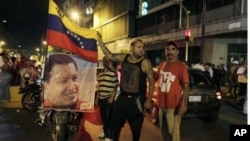The Socialist party of Venezuelan President Hugo Chavez has won legislative elections, with opposition parties winning 35 percent of seats. Opposition groups said the results marked a key victory in their attempts to place a check on Mr. Chavez.
Election officials announced the results after midnight in Venezuela, following delays at polling stations outside the capital, Caracas. The head of the National Electoral Council, Tibisay Lucena, said officials waited to release numbers until the outcome of a handful of tight races became clear.
She said, in spite of a few glitches, the vote was a success.
Lucena offered congratulations to candidates who won, and those who lost, saying it was a great contest.
Initial results indicate the Socialist party of President Hugo Chavez claimed at least 90 seats in the National Assembly. Opposition groups took at least 59, and two seats went to a party that split from the ruling Socialists this year.
The outcome gives opposition leaders more than a third of seats in the assembly, enabling them to block President Chavez from passing major legislation which requires two-thirds approval.
For some opposition candidates, the vote results showed a clear message of support from voters. In Caracas, opposition candidate Maria Corina Machado said Venezuelans do not want to see the county pushed further toward Communism.
Machado said the people have rejected the current National Assembly, adding that elected lawmakers must work to represent all of the country and not just part of it.
Opposition leaders said the results showed they had claimed 52 percent of the general vote across Venezuela, defeating the ruling Socialist party. However, a new redistricting plan has boosted the number of National Assembly seats in areas with relatively lower populations.
The governor of northwestern Zulia state, Pablo Perez, said the nation's election system prevented opposition candidates from claiming 52 percent of seats in the National Assembly. But he said the vote was a clear victory for the opposition.
Perez said the challenge is for all opposition leaders to be prepared to work with the government and Socialist lawmakers to help the country.
Many voters say the new assembly must be prepared to tackle growing problems, such as rising inflation and unemployment, and violent crime fueled in part by the illegal drug trade.










